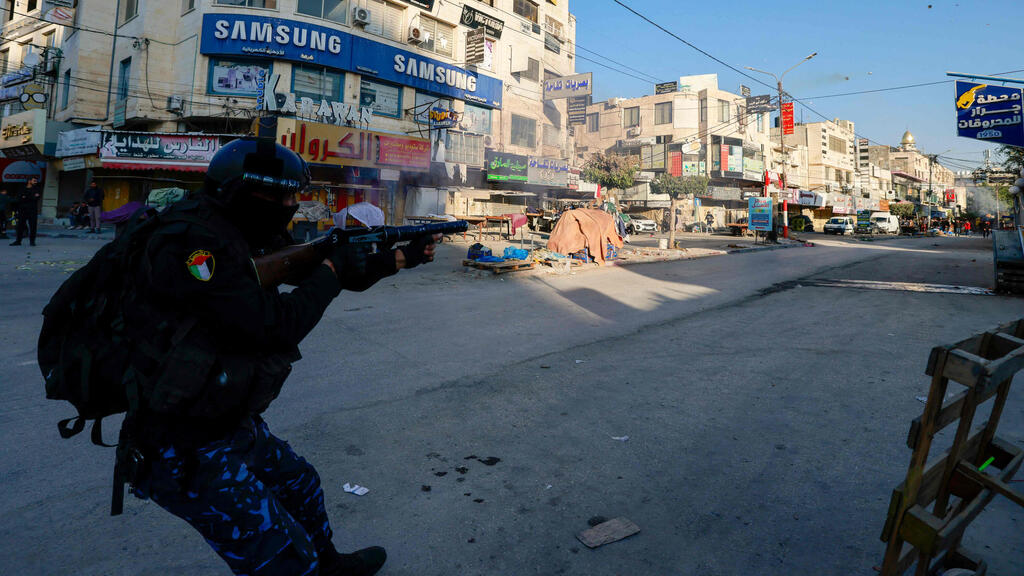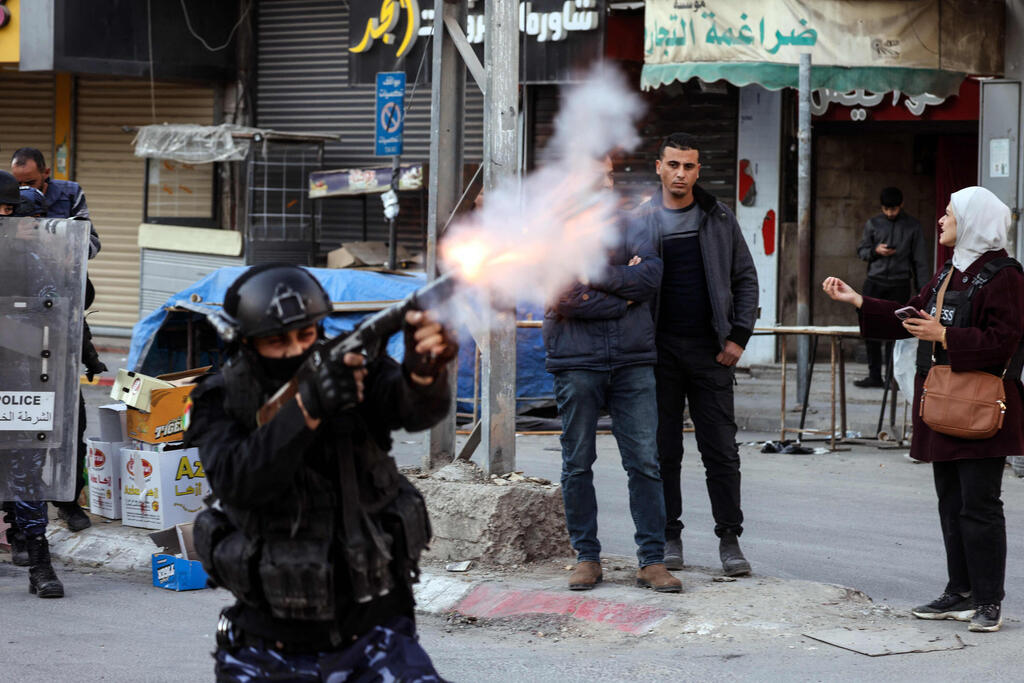Getting your Trinity Audio player ready...
Jenin Brigades fighters race through alleys flooded with sewage to evade the gunfire that echoes all around. "Quickly," one of the fighters urges his comrades as they pass through patrols and barricades of the Palestinian Authority security forces. "Watch out," another cautions at an intersection where an improvised explosive device had been planted. This could have been a response to the IDF raid on the city and the refugee camp in the northern West Bank, but instead it is a report after two Washington Post reporters witnessed up close a rare battle of the Jenin fighters against their internal enemy: the Palestinian Authority .
Clashes and exchanges of fire between armed men and security forces in Jenin
It happened two weeks ago. After many years, Palestinian security forces launched an arrest operation in the crowded refugee camp in an attempt to regain control. The PA, supported by Western countries, is trying to prove that it can manage security in the limited areas it controls in the West Bank, as a reminder to the world that it also seeks to control the Gaza Strip the day after the war ends.
The U.S. newspaper reported that Prime Minister Benjamin Netanyahu has ruled out the return of the Palestinian Authority to Gaza as a governing body. However, according to a former senior Egyptian official who spoke to the Post on condition of anonymity, Israel has agreed to let the Palestinian Authority manage the Rafah crossing between Gaza and Egypt for a short period.
4 View gallery


PA security forces operating in the West Bank city of Jenin
(Photo: Jaafar Ashtiyeh / AFP)
The PA launched "Operation Protect the Homeland" in November to retake control of Jenin camp by targeting “outlaws” and those “spreading chaos and anarchy and harming civil peace,” security forces spokesman Anwar Rajab told The Post. “All these actions and policies undermine the work of the PA, and these groups give Israel an excuse to implement its plans in the West Bank.”
According to Rajab, the "achievements" of the operation included the arrest of dozens of wanted individuals, the injury of others, the detonation of dozens of explosive devices, and the advancement of important routes into the refugee camp. The security forces killed three people during the operation: a gunman, a 19-year-old young man riding a motorcycle, and a 14-year-old boy.
Still, both sides appear to be showing relative restraint, according to the report.
'Don’t want to see a single drop of blood being shed'
According to the Ramallah Health Ministry, which does not distinguish between terrorists and civilians, at least 21 people were killed in the long IDF raid on Jenin in September. The IDF said 14 terrorists were killed. The PA also occasionally clashes with armed Palestinians. Since the October 7 massacre, PA security forces have killed 13 Palestinians, including eight in total in Jenin.
"We don't want to see a single drop of blood shed," Sabri Saidam, an advisor to Palestinian Authority President Mahmoud Abbas and a member of his Fatah central committee, told The Washington Post. "What we would like to achieve is a state of calm, to sit down with different factions and agree on the way forward."
A senior Palestinian source close to the PA chairman said on condition of anonymity that Abbas has decided that the Palestinian Authority will "impose its authority and there is no turning back."
But two weeks after the PA operation began, gunmen are still roaming freely in the Jenin refugee camp. The sound of gunfire can be heard around the clock. The UN agency for Palestinian refugees has closed schools, and businesses are also closed. In some of the neighborhoods, which were badly damaged in the Israeli raid in September, some families were left without electricity and water for days, according to the report.
Masked security personnel patrol the government hospital in Jenin. Snipers are stationed on the roof to prevent armed men from trying to hide in its grounds, a hospital source said. The Post's reporters heard gunfire from the roof. The source said several bullets pierced a window in the office, and patients and staff are afraid to come.
There is an enormous amount of anger at the security forces in the West Bank. Their men operate in a limited area and, according to agreements with Israel, they are not allowed to deal with violence from settlers and, of course, IDF raids. Many Palestinians see the forces as subcontractors of Israel and a tool of Abbas for corruption and the suppression of internal opposition.
'24 hours later there will be someone new in their place'
“The people want ‘law and order’, but apply the law right and people will stand with you,” said Arwad, 35, who spoke on the condition his last name be withheld out of concern for reprisal from Palestinian and Israeli authorities. “When the Israeli soldiers and jeeps come here, where is the law?”
Arwad's brother and father are in Israeli prison. Other relatives of his were killed by IDF fire. Even if the authority arrests wanted terrorists, he said, “the resistance will continue. Twenty-four hours later there will be someone new in their place.”
According to Rajab, the operation in Jenin targeted suspects wanted for criminal offenses, including shooting at hospitals and making explosive devices. He said this escalated when gunmen stole and burned two security force vehicles, and a car bomb exploded near a police station. On the ground, attempts were made to mediate a cease-fire between the gunmen and the security forces but, according to Firas Abu al-Wafa, Fatah's secretary-general in Jenin, the PA refused to compromise.
Saidam said talks continue and “the security apparatus is adamant to impose law and order.”
Wafa added that “If the situation in Jenin stabilizes, then the whole West Bank will be stable." But if it doesn’t, “there will not be stability across the West Bank.”
Get the Ynetnews app on your smartphone: Google Play: https://bit.ly/4eJ37pE | Apple App Store: https://bit.ly/3ZL7iNv
For several hours the shooting ceased, after the Palestinian Authority and the Jenin Brigades agreed to hold their fire. At sunset, several gunmen were seen emerging from the alleys; the day before, they had gathered in various areas of the refugee camp to confront the security forces.
4 View gallery


Smoke from clashes between Palestinian security forces and armed men in Jenin
(Photo: AP /Majdi Mohammed)
Two PA vehicles stood at one end of the road, the forces firing stun grenades as a warning. An Israeli drone buzzed overhead. On the other side of the road, gunmen and camp residents gathered. Women and children waved Palestinian flags.
“We hope that the security forces leave the camp, because it’s forbidden to shed blood,” said a camp resident, who has a child that was previously killed by IDF fire. The fighters are “defending their country.”






